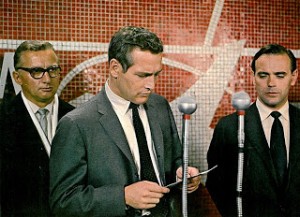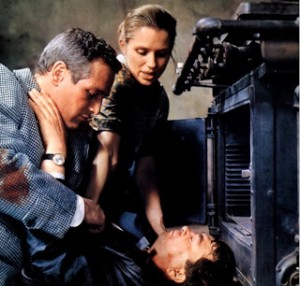Torn Curtain *** (1966, Paul Newman, Julie Andrews, Lila Kedrova, Ludwig Donath, Wolfgang Kieling, Tamara Toumanova) – Classic Movie Review 228
Alfred Hitchcock’s 1966 espionage suspense thriller film Torn Curtain has its moments of tension and suspense. Paul Newman tries hard but is miscast as an American atomic scientist, who seems to defect to East Germany.
Alfred Hitchcock’s 1966 espionage suspense thriller film Torn Curtain has its moments of tension and suspense. It is twisty and quite fun, and is entirely enjoyable enough. But it also often seems lethargic, rambling and overlong, and is definitely a lesser effort from such a master craftsman.
The very un-Hitchcock-like Method actor Paul Newman tries hard but is miscast as an American atomic scientist, Professor Michael Armstrong, who apparently publicly defects to East Germany because the US Government has cancelled his research programme. But he is actually planning to get to Professor Lindt (Ludwig Donath) in Leipzig to send his secrets for the solution for a formula resin back to the US.
Another player you don’t really expect in a Hitchcock film, Julie Andrews, is equally not at her best. She is brisk, efficient and professional, but that is all, as Newman’s fiancée-assistant, Sarah Sherman. It is most unfortunate that the two stars share no chemistry. You never swallow the idea that they are a romantic couple or that Newman is an atomic scientist.
The couple go to Stockholm, where Newman is attending a physics conference. He suggests she should go back to the US, while he stays on. He has kept her in the dark about his activities. But, when she finds out, she makes his life way more complicated when she follows him, discovers he is actually headed for East Germany, pursues him there and turns up unexpectedly on the other side of the Iron Curtain. Now in great danger, the couple then somehow have to figure out a plan to evade the bad guys and escape back home to safety in the West.
Hitchcock’s landmark 50th movie shares themes and sensibilities with his best films, but is nowhere near the equal of his other great spy-chase thrillers like The 39 Steps or North by Northwest. Miscast though the stars are, the main problem mainly lies with Irish-Canadian writer Brian Moore’s sticky screenplay. It is not a bad plot by any means but the script cannot quite make it work and nor can Hitchcock.
But there are still well-orchestrated and imaginatively handled sequences of excitement and high anxiety to relish, especially the notably violent kitchen-murder scene when Newman, together with the farmer’s wife, is forced to kill the East German secret service agent Hermann Gromek (Wolfgang Kieling), who has uncovered his mission.
The bus ride form Leipzig to Berlin and the escape from a ballet theatre (featuring Tamara Toumanova as the ballerina) are also genuine classic Hitch nail-biters. These scenes show the authentic Hitchcock touch.
Both stars provide plenty of allure and glamour but seem largely uncomfortable, and they share zero screen chemistry, a mismatch. Some of the movie is noticeably underpowered and contrived. But it just escapes from being judged a negligible time-passer and becomes a watchable curio thanks to Hitchcock’s quirky intelligence, plush, old-style craftsmanship and some old-fashioned likeability. There is also compensation in the support performances of the colourful cast of international actors: especially Wolfgang Kieling as Hermann Gromek, Ludwig Donath as Professor Gustav Lindt, and Lila Kedrova as Countess Kuchinska.
It is upsetting to have to apologize for a Hitchcock movie though.
Also in the cast are Hansjörg Felmy, David Opatoshu, Günter Strack, Gisela Fischer, Mort Mills, Carolyn Conwell, Arthur Gould-Porter, Gloria Gorvin, Jan Malmsjö, Peter Lorre Jr, Frank Baker, Peter Bourne, Barry Cahill, Hans Difflipp, Maurice Doner, Harold Dyrenforth, Lester Fletcher, Sasha Harden, Jimmie Horan, Gerd Rein, Leoda Richards, Gene Roth, Hermine Sterler, Wilhelm von Homburg and Curt Lowens as VOPO Officer at Roadblock.
Torn Curtain is directed by Alfred Hitchcock, runs 128 minutes, is made and released by Universal Pictures, is written by Brian Moore (screenplay), Willis Hall (uncredited contributor to screenplay) and Keith Waterhouse (uncredited contributor to screenplay), is shot in Technicolor by John F Warren, is produced by Alfred Hitchcock, and scored by John Addison, with production design by Hein Heckroth.
Composer Bernard Herrmann was fired from Torn Curtain when a pop-and-jazz-influenced score was preferred, either by Hitchcock or by the studio, or maybe both. Herrmann provided a score they rejected and his revisions failed to satisfy them. John Addison was approached to write another score. It ended Hitchcock and Herrmann’s fruitful professional relationship.
Release date: July 14, 1966 (US).
Despite all its weaknesses and failings, it was a huge hit. On a budget of $3 million, the box office was $13 million.
Newman said: ‘I think Hitch and I could have really hit it off, but the script kept getting in the way.’ Newman called Andrews ‘the last of the really great dames’. Now there’s a real gentleman!
Newman questioned Hitchcock about the script and the characterisation throughout filming but insisted he meant no disrespect. When Newman asked about his character’s motivations, Hitchcock replied: ‘Motivation is your salary.’ But Hitchcock was always very polite with Julie Andrews. She recalled:’ I don’t feel that the part demanded much of me, other than to look glamorous, which Mr Hitchcock can always arrange better than anyone. I did have reservations about this film, but I wasn’t agonised by it. The kick of it was working for Hitchcock. That’s what I did it for, and that’s what I got out of it.’
Hitchcock explained: ‘I got the idea from the disappearance of the two British diplomats Burgess and MacLean. I said to myself, what did Mrs MacLean think of the whole thing.’ Burgess and Maclean defected to the Soviet Union in 1951. Hitchcock was fascinated with Maclean’s life in the Soviet Union and about Maclean’s wife Melinda Marling, who followed her husband behind the Iron Curtain a year later with the couple’s three children.
However, during production, Hitchcock shifted the point of view of the plot from the defecting scientist’s wife to the American amateur spy, and then focused on the colourful international actors. Lila Kedrova was Hitchcock’s favourite, a guest in his home. When the film was shortened in post-production, her scenes were left intact.
Hitchcock hired Brian Moore had written his excellent first novel 1955 Judith Hearne novel, filmed in 1987 as The Lonely Passion of Judith Hearne. Moore had adapted his own novel The Luck of Ginger Coffey into a film the previous year, as The Luck of Ginger Coffey.
Moore’s final draft of the screenplay, completed by 21 June 1965, pleased neither Hitchcock nor Universal, as it lacked the Hitchcock-style humour and sparkle characteristic of a film. Moore complained Hitchcock had ‘no concept of character’ and had ‘a profound ignorance of human motivation’.
Hitchcock then hired British authors Keith Waterhouse and Willis Hall, who worked rewriting dialogue daily as the film was being shot. But the Writers Guild gave sole screenplay credit to Brian Moore.
Shooting started on 18 October 1965, on Stage 18 at the Universal back lot in Los Angeles and ended in mid-February 1966. The theatre climax was filmed on Sound Stage 28, used in the 1925 The Phantom of the Opera and the 1943 The Phantom of the Opera.
Alfred Hitchcock’s cameo is eight minutes into the film, sitting in the lobby of the Hotel d’Angleterre holding a baby. The music playing is Funeral March of a Marionette, the Alfred Hitchcock Presents theme.
Curt Lowens [Kurt Löwenstein], a Polish Holocaust survivor and World War Two hero who came to Hollywood, died on 8 May 2017, aged 91. He saved about 150 Jewish children during the Holocaust.
The cast are Paul Newman as Professor Michael Armstrong, Julie Andrews as Sarah Sherman, Lila Kedrova as Countess Kuczynska, Hansjörg Felmy as Heinrich Gerhard, Tamara Toumanova as Ballerina, Wolfgang Kieling as Hermann Gromek, Ludwig Donath as Professor Gustav Lindt, Günter Strack as Professor Karl Manfred, David Opatoshu as Mr Jacobi, Gisela Fischer as Dr Koska, Mort Mills as Farmer, Carolyn Conwell as Farmer’s Wife, Arthur Gould-Porter as Freddy, the Bookseller, Gloria Gorvin as Fräulein Mann, Jan Malmsjö, Peter Lorre Jr, Frank Baker, Peter Bourne, Barry Cahill, Hans Difflipp, Maurice Doner, Harold Dyrenforth, Lester Fletcher, Sasha Harden, Jimmie Horan, Gerd Rein, Leoda Richards, Gene Roth, Hermine Sterler, Wilhelm von Homburg and Curt Lowens as VOPO Officer at Roadblock.
http://derekwinnert.com/the-39-steps-classic-film-review-119/
http://derekwinnert.com/north-by-northwest-classic-film-review-4/
© Derek Winnert 2013 Classic Film Review 228 derekwinnert.com







